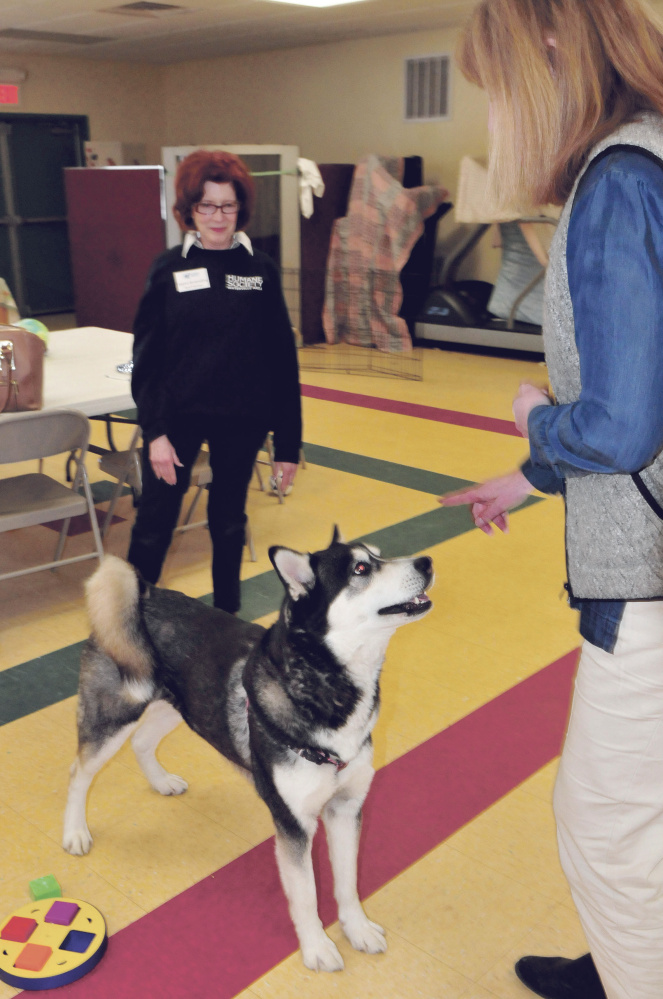A last-minute appeal saved Dakota the dog Wednesday, even after she was taken to the veterinarian’s office to be euthanized.
Dakota, the 4-year-old Husky pardoned by the Gov. Paul LePage last month, was taken from the Humane Society Waterville Area to a veterinarian after a Tuesday public hearing at Waterville District Court where a judge denied a request to stop a euthanization order.
Once word came that Matthew Perry, the defendant in the case and Dakota’s past owner, had filed an appeal, she was taken back to the shelter, according to Bonnie Martinolich, a partner at PretiFlaherty law firm in Portland and the attorney for Linda Janeski, Dakota’s current owner.
“Part of the immediacy was that I knew they were going to go get her,” Martinolich said.
Kennebec County District Attorney Maeghan Maloney said as soon as she received word of the appeal, she contacted law enforcement officers to prevent the dog from being euthanized. She said the dog remains at the shelter because the appeal froze the order.
Perry, who does not have an attorney, filed the appeal Tuesday on his own behalf in Augusta District Court. The appeal claims that it was wrong of the court to order on March 21 that Dakota be euthanized, and that it was wrong to keep the order in place despite the pardon Dakota received from LePage on March 30.
Lisa Smith, director of the Humane Society, said Dakota remains at the shelter as they wait for the legal process to continue. Smith said she couldn’t comment on whether Dakota was taken to the veterinarian Tuesday.
“We’re trying to work with law enforcement, the judges, the lawyers, the public and the animal welfare advocates, and we’re right in the middle,” she said, adding later, “I think this is totally unprecedented.”
Dakota was declared a dangerous dog in February 2016 after getting loose in Winslow and killing Zoe, a smaller dog. Perry was ordered to keep Dakota confined, but she got loose again this past January. The dog went back to the victims’ house, attacking their new dog, Bruce Wayne, and biting his throat, according to Maloney.
Animal Control Officer Chris Martinez, who works in the Waterville and Winslow area and handled Dakota’s case, said he was unable to comment on anything now.
Dakota was found later as a stray and taken to the Humane Society, which said she did well on aggression tests and was a “model resident.” She was given through adoption to Linda Janeski, who was unaware of the March court date that decided Dakota’s fate.
A Humane Society board member sent Dakota’s story to LePage, who granted the dog a “full and free pardon,” according to a news release from his office.
While Maloney said Tuesday that LePage’s pardon is “irrelevant,” it remains unclear in the case whether it holds any legal clout. Legal experts told the Morning Sentinel that the Maine Constitution gives LePage broad power for pardons, and that this reflects the evolution of animal laws.
The case is expected to go to Maine Supreme Judicial Court, the highest court in the state.
Martinolich said she thinks the governor’s pardon will play a large role in the case.
“The governor wants to help save Dakota. I believe that the governor’s pardons rights under the Maine Constitution are very broad,” she said. “And I believe that that is going to be a very contested issue, but I also believe that the governor’s pardon will be a key in helping us save Dakota.”
When asked if she thinks the court would refuse to hear the appeal, Martinolich said she doesn’t think it will.
“We are all just stunned that a statute in Maine would be interpreted to mean that you don’t have due process of law in a case where the outcome is irreversible,” she said, adding that she is “very optimistic” about the case.
Martinolich expects to file an appeal on behalf of Janeski by Thursday.
Smith, the shelter director, said they are hoping to provide more resources to encourage responsibility among pet owners.
“What we’re trying to take away is a positive, and asking … everybody look at your own dog and do what you can to provide whatever your dog may need, be it training, better fencing, better oversight or supervision,” she said. “Situations like this could happen because dogs are living with dog instincts in a human world.”
Madeline St. Amour — 861-9239
mstamour@centralmaine.com
Twitter: @madelinestamour
Send questions/comments to the editors.



